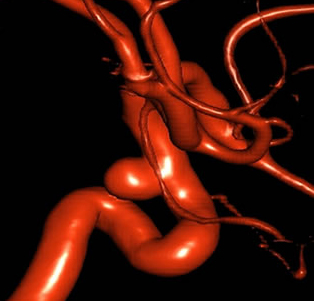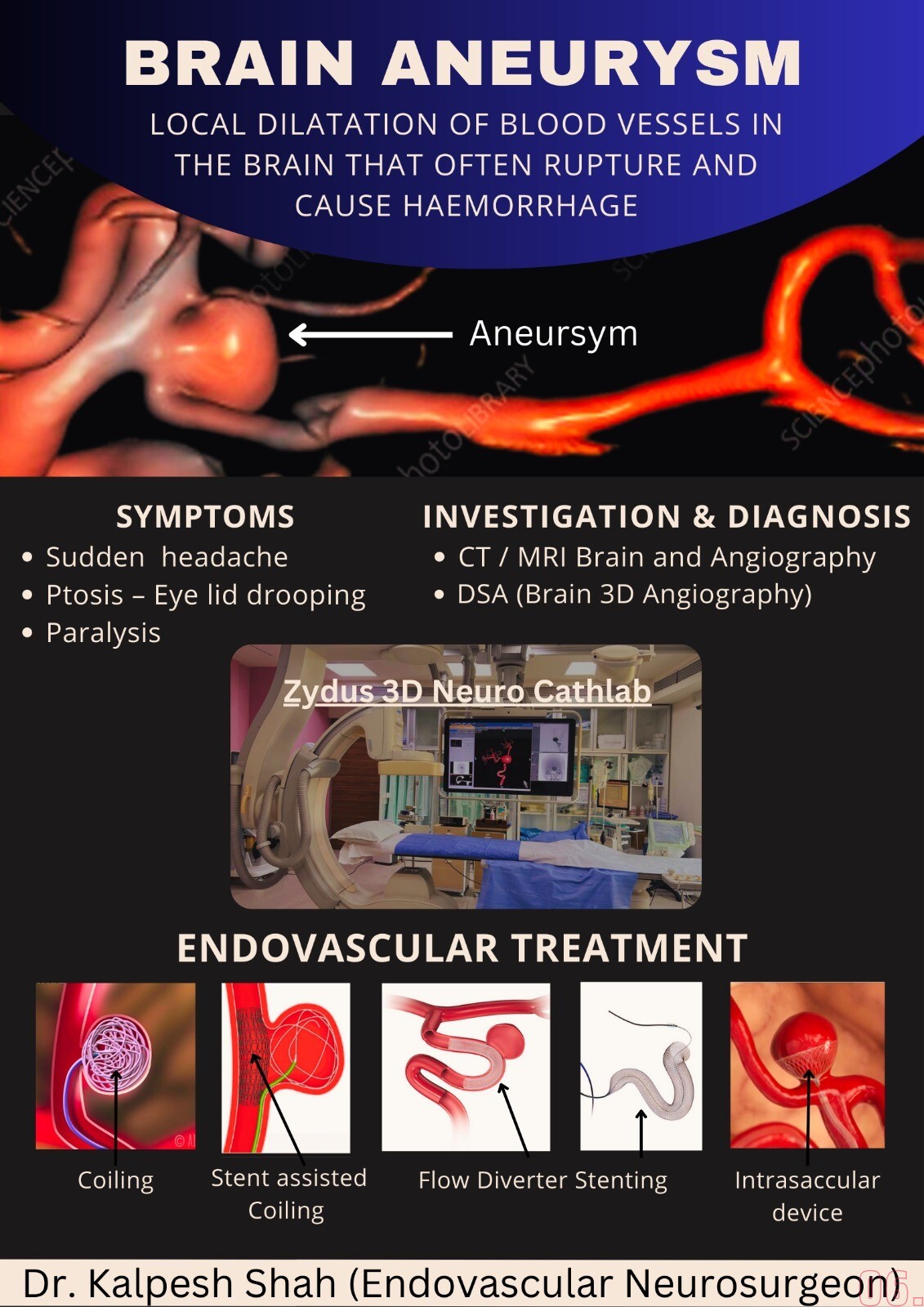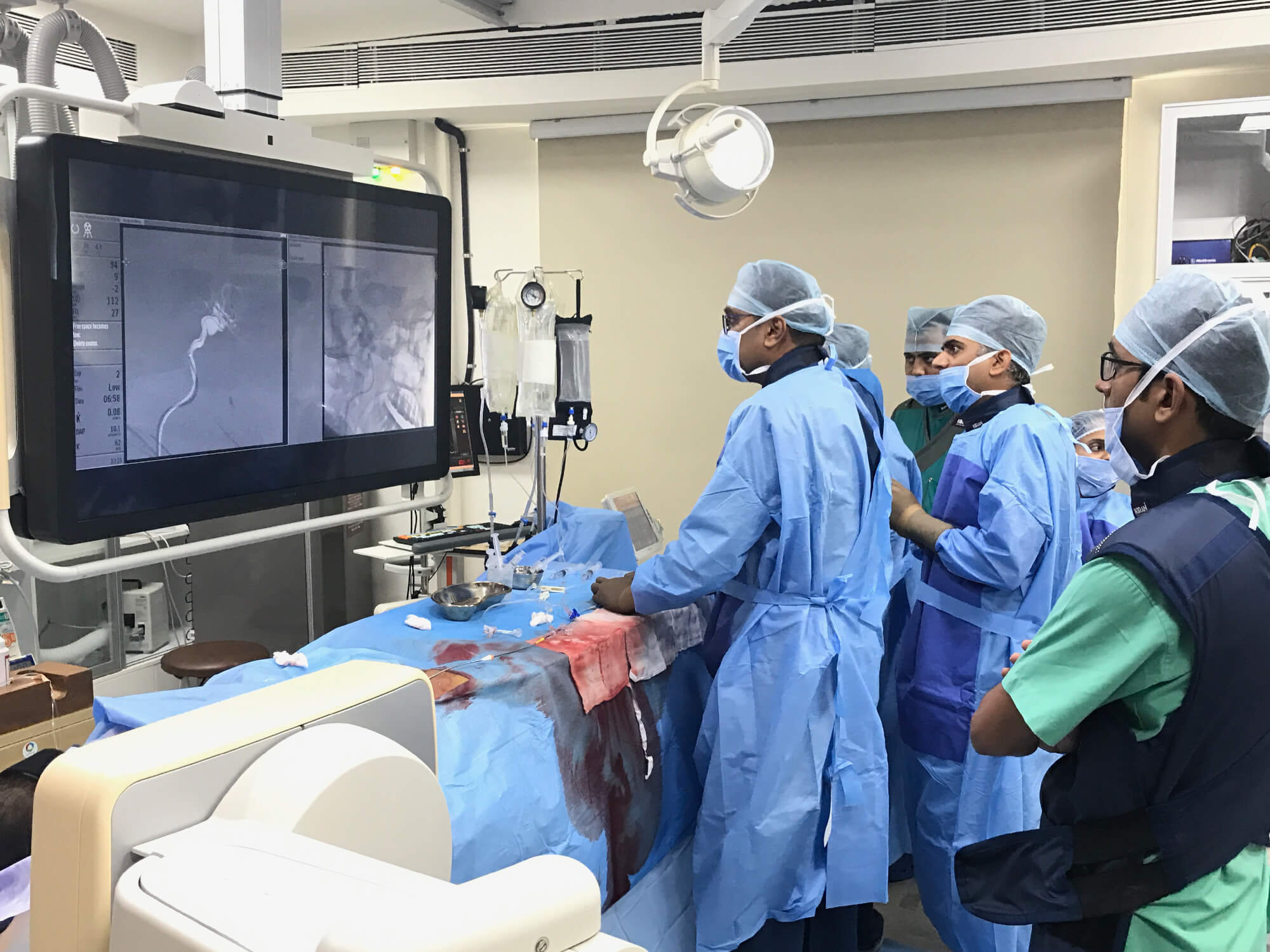Aneurysm Brain Symptoms & Treatment
Brain Aneurysm: Causes, Symptoms, Diagnosis, and Treatment by
Dr. Kalpesh Shah
Dr. Kalpesh Shah is a renowned neurosurgeon with years of experience in treating patients with various neurovascular conditions, including brain aneurysms. This page aims to educate and raise awareness about this condition while highlighting Dr. Shah’s expertise in providing comprehensive care to his patients.
What is a Brain Aneurysm?
A brain aneurysm, also known as a cerebral aneurysm, is a weakened and bulging area in the wall of an artery within the brain. This bulge has the potential to rupture, leading to a potentially life-threatening condition known as a subarachnoid hemorrhage. Understanding the causes, recognizing the symptoms, and seeking timely medical intervention are crucial for managing brain aneurysms effectively.
Causes of Brain Aneurysms
The exact causes of brain aneurysms are not yet fully understood. However, several factors are believed to contribute to their formation, including:
- Weakness in the blood vessel walls: Certain structural weaknesses in the arterial walls can make them prone to aneurysm formation.
- Genetic factors: Family history of brain aneurysms increases the risk of developing one.
- Gender and age: Women, especially those over the age of 40, have a higher risk.
- High blood pressure: Uncontrolled hypertension can put strain on the blood vessel walls, increasing the risk of aneurysm development.
- Smoking and drug abuse: These activities can damage the blood vessels, making them more susceptible to aneurysm formation.
Symptoms of Brain Aneurysms
Brain aneurysms often do not cause symptoms until they rupture or grow significantly. However, some warning signs may include:
- Sudden and severe headaches
- Nausea and vomiting
- Blurred or double vision
- Stiff neck
- Sensitivity to light
- Loss of consciousness or seizures (in case of a rupture)
It is important to note that not everyone experiences symptoms, and some aneurysms may be incidentally discovered during diagnostic imaging for unrelated conditions.
Diagnosis of Brain Aneurysms
If a brain aneurysm is suspected, Dr. Kalpesh Shah will conduct a thorough evaluation, which may involve:
- Medical history review: Understanding the patient’s medical background and any potential risk factors.
- Neurological examination: Assessing reflexes, coordination, and mental status.
- Imaging tests: Utilizing advanced imaging techniques such as magnetic resonance imaging (MRI), computed tomography (CT) scan, or cerebral angiography to visualize the aneurysm and assess its characteristics.
- Lumbar puncture: In some cases, a sample of cerebrospinal fluid may be collected for analysis to confirm a ruptured aneurysm.
Treatment Options for Brain Aneurysms
Dr. Kalpesh Shah specializes in both surgical and endovascular treatment options for brain aneurysms, depending on the individual case. The treatment approach may include:
- Endovascular coiling: A minimally invasive procedure where a catheter is navigated through the blood vessels to the site of the aneurysm. Platinum coils are then placed within the aneurysm to promote blood clotting and prevent rupture.
- Surgical clipping: A procedure where a small metal clip is placed around the neck of the aneurysm to stop blood flow and prevent rupture. This is performed through open brain surgery.
- Flow diversion: In complex cases, a stent-like device called a flow diverter can be placed across the neck of the aneurysm to redirect blood flow and encourage healing.
- Observation: For small, unruptured aneurysms that pose a lower risk, Dr. Shah may recommend regular monitoring and lifestyle modifications to minimize the risk of rupture.
Brain aneurysms require careful evaluation, accurate diagnosis, and appropriate treatment. Dr. Kalpesh Shah’s expertise in neurosurgery and his patient-centered approach ensure that each individual receives personalized care and the most advanced treatment options available. If you suspect a brain aneurysm or would like to learn more about your options, we encourage you to schedule a consultation with Dr. Shah to discuss your concerns and develop a comprehensive treatment plan tailored to your needs. Your well-being and long-term health are our top priorities.
Follow-up Care and Rehabilitation
After the treatment of a brain aneurysm, it is essential to prioritize follow-up care and rehabilitation. Dr. Kalpesh Shah and his team provide comprehensive post-treatment support, which may include:
- Medication management: Prescribing and monitoring medications to manage pain, prevent complications, and promote healing.
- Regular check-ups: Scheduling follow-up appointments to assess recovery progress and address any concerns or complications.
- Rehabilitation therapy: Referring patients to specialized rehabilitation programs, if needed, to help regain strength, coordination, and cognitive function.
- Lifestyle modifications: Providing guidance on lifestyle changes, such as quitting smoking, managing blood pressure, and adopting a healthy diet, to minimize the risk of future aneurysms.
Why Choose Dr. Kalpesh Shah?
Dr. Kalpesh Shah is a highly experienced neurosurgeon with a deep understanding of neurovascular conditions, including brain aneurysms. His commitment to patient-centered care, advanced surgical techniques, and cutting-edge technology ensures that his patients receive the best possible treatment and outcomes. Dr. Shah’s compassionate approach, combined with his expertise, makes him a trusted choice for patients seeking treatment for brain aneurysms.



